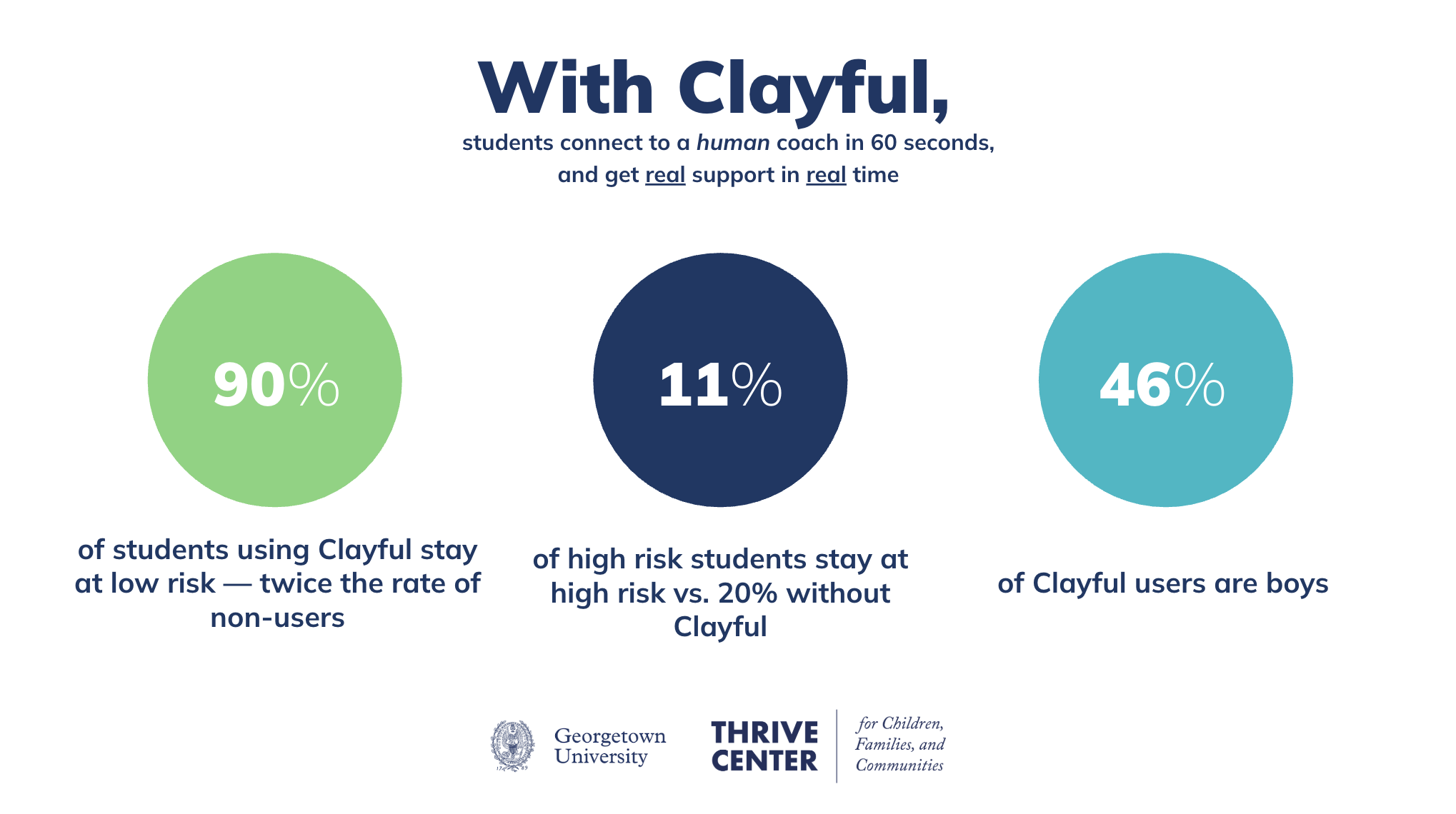
Clayful, an innovative mental health company focused on school-based prevention and intervention, was proud to participate in the Thrive Center’s Solutions Fair at Georgetown University in May. As a member of the Thrive Fellowship’s inaugural cohort, Clayful spent the last four months analyzing impact data in order to accelerate its mission to make mental health support universally accessible for all youth — before crisis hits.
About the Thrive Center & Solutions Fair
The Thrive Center at Georgetown University is a national innovation hub that supports visionary leaders reshaping the systems that serve children, families, and communities. The Solutions Fair serves as the Fellowship’s culminating event, inviting changemakers to present scalable solutions to the country’s most pressing mental and behavioral health challenges.
At the Fair, Clayful spotlighted its real-time, chat-based mental health coaching model that connects students with human coaches — not AI — in under 60 seconds. Available in schools, after hours, and in over 130 languages, Clayful reduces barriers to care and meets students where they are, with support that is private, preventative, and proven to make a difference.
“We’re honored to be part of this incredible community of changemakers,” said Maria Barrera, Founder and CEO of Clayful. “Mental health care shouldn’t be something kids access only after they break. Clayful is helping students build skills early — so they’re supported before stress snowballs into crisis.”
Spotlight on Clayful’s Preventative Coaching Model
Clayful’s model addresses gaps in traditional mental health systems by offering three levels of support: Tier 1 coaching to help students stay well, Tier 2 interventions that respond in real time to emerging stress, and Tier 3 support that complements therapy and crisis services. Through the fellowship with Georgetown’s Thrive Center, Clayful conducted a rigorous impact analysis based on over 26,000 coaching sessions. Highlights include:
- 90% of low-risk students (Tier 1) who used Clayful stayed well all year — twice the rate of non-users.
- 11% of high-risk students (Tier 3) remained in crisis — compared to 20% without Clayful. That’s a 9-point drop in ongoing risk.
- 46% of users are boys — significantly outperforming traditional models in engaging this underserved group.
“Clayful isn’t just an innovative app — it’s a critical piece of the mental health ecosystem,” said Maria Barrera, CEO and Founder of Clayful. “We keep low-risk students from unnecessary suffering, accelerate healing for those in crisis, and reach the kids who usually slip through the cracks.”
Dr. Megan McCormick, a clinical psychologist, Associate Professor of Medicine, and the Co-Founder of the Center for Wellbeing in School Environments at Georgetown, shared several case examples at the Fair, including a student in crisis who uses Clayful to reinforce therapy skills between sessions, a student teetering on burnout who avoids escalation thanks to early support, and a Black teenage boy in an under-resourced community who accesses mental health support for the first time via Clayful’s low-barrier model.
“Schools shouldn’t have to wait for students to fail to offer support,” said Dr. Megan McCormick, Director of Programs & Research. “Clayful gives students tools to manage stress in the moment, and helps educators create healthier, more stable learning environments.”
A Call to Invest on What Works & Expand to Caregivers & Educators
The Solutions Fair marks both a celebration of innovation and a call to action: to invest in integrated, preventative systems that give young people the mental health support they deserve.
“Our goal is to make it easier for every student to get the support they need, no matter their background or level of risk,” said Barrera. “We’re excited to expand our impact — not only for students but for educators and caregivers too — and are actively working to align public, private, and philanthropic funding to make this vision sustainable.”
To learn more about Clayful or explore opportunities to partner, visit www.clayfulhealth.com.
About the Thrive Center at Georgetown University
The Thrive Center for Children, Families, and Communities is a collaboration between Georgetown University and MedStar Health, with a shared mission to rapidly advance equitable systems of care and support that enable children, families, and communities to thrive. The Innovation Hub @Thrive Center is a three-month fellowship program that helps startups and nonprofits focused on child and family health scale their impact, powered by the Thrive Center’s experts and connections.
Applications are now OPEN for the Fall 2025 Innovation Hub Fellowship at Georgetown’s Thrive Center. Passionate innovators who are building impactful solutions in mental health, disability, and developmental support in the early childhood space can apply here by June 13, 2025
About Clayful
Clayful is a mental health company providing real-time, chat-based coaching for students — anytime, anywhere, and in over 130 languages. Designed to be preventative, accessible, and stigma-free, Clayful connects young people with trained human coaches in under 60 seconds to support emotional wellbeing before stress escalates into crisis. By partnering with schools, Clayful helps build healthier learning environments and reaches students who often fall through the cracks. Learn more at www.clayfulhealth.com.

